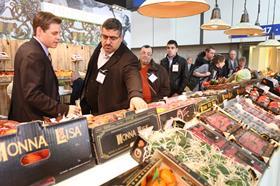
Using corrugated cardboard boxes instead of reusable plastic crates could result in a saving of €64m a year for Murcia’s fresh produce industry, according to producer organisation Proexport.
During a one-day conference analysing the profitability and sustainability of fruit and vegetable packaging which took place in Murcia on Wednesday, the association revealed the results of a study it had commissioned on the comparative costs of cardboard and plastic crates.
The study concluded that plastic crates, which are currently used to transport 23 per cent of Murcia’s lettuce, broccoli, pepper, melon, artichoke and tomato production, costs growers €27.6m a year more than if they were to use cardboard boxes. Taking into account the region’s entire fruit and vegetable production this figure would be as much as €63.7m, Proexport said.
“In spite of this emphatic result there remains a generalised grievance among many producers that their choice of packaging is imposed on them by their international clients, which can result in them being forced to make uneconomical and environmentally unsound decisions,” said Proexport’s general director Fernando Gómez.
The use of plastic container pooling services operated by multinational companies has become more widespread in recent years and they are the preferred option for many European retailers.
The authors of the study, Antonio Villafuerte and Pedro Torres of the San Telmo International Institute, conclude that a greater degree of consolidation among producers would be one way of giving them a stronger voice in the agrifood chain and enabling them to defend their interests.
Morover, they point out that cardboard packaging enabled producers to differentiate their offer and promote themselves to the final consumer and as such was an important tool in helping them to optimise their costs and add value to their brand.
The research shows that choosing cardboard over plastic results in an average saving of €0.27-€1.10 per box sold, equivalent to €0.04-€0.18 per kg of production.